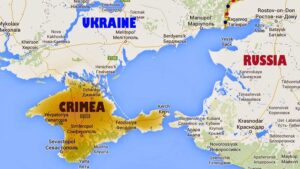
Pic Courtesy: Aljazeera
Ukraine, since independence in 1991 has been torn between its former Soviet masters (Russia) and the Western institutions (NATO) it wants to join.
Historical Background
Independence. In December 1991, Ukraine voted in favour of independence from the Soviet Union in a referendum. Russian President Boris Yeltsin accepted the vote and Russia, Ukraine and Belarus set up a Commonwealth of Independent States (CIS).
(Process of fall of the mighty Russian empire – USSR)
Agreement. In the aftermath of the end of the Cold War, Ukraine, Russia, the UK and the US in December 1994 agreed to respect the independence, sovereignty and borders of Ukraine. The agreement was in exchange for Ukraine abandoning the nuclear weapons it inherited from the Soviet Union.
(Action justified as it was required to control Nuclear Proliferation.)
Friendship Treaty. In May 1997 Russia and Ukraine signed a friendship treaty. It settled a key disagreement and allowed Russia to retain ownership of the majority of ships in the Black Sea fleet (based in Ukraine’s Crimea) in exchange of Moscow paying Kyiv a modest rent to use the port of Sebastopol. Moscow also remained Kyiv’s most important commercial partner, with Ukraine totally dependent on Russian oil and gas.
(Treaty heavily in favour of Russia – but Ukraine had to accept it)
Economic Push and Pull.
In 2003, Ukraine signed an accord with Russia, Belarus and Kazakhstan on a Common Economic Space. Western bloc showed displeasure indicating that these actions could hinder Ukraine’s rapprochement with the bloc and its membership to the World Trade Organization.
(Economic factors are big drivers of the geopolitics and foreign affairs).
Russia and Ukraine were engaged in several disputes, notably over gas in 2006 and 2009 which disrupt Europe’s energy supplies.
(Wheels within wheels)
Main Bone Of Contention
Perceiving the CIS as an attempt to bring ex-Soviet republics under Moscow’s control, Ukraine always takes a lukewarm approach to it. Its tilt is towards the West and it seeks ties with the US-led NATO military alliance.
(This is not palatable to Russia. The question is how far it would go to retain control of its erstwhile state)
Domestic See Saw
For 10 years under the leadership of Leonid Kuchma, Ukraine staggered between the Eastern and the western bloc.
Orange Revolution. Ukraine’s 2004 presidential election was marred by fraud and the victory of the pro-Russian Viktor Yanukovych provoked unprecedented protests in the peaceful Orange Revolution.
(Classic case of one country meddling in the elections of another one).
Western Tilt and Push. The uproar led to the election results being cancelled and pro-Western opposition leader Viktor Yushchenko (who was the victim of a mysterious dioxin poisoning during the campaign), became president. Yuschenko swiftly reiterated Ukraine’s wish to join the EU, along with NATO. In 2008 at a summit in Bucharest, NATO leaders agreed that Ukraine has a future in the alliance, sparking Moscow’s ire.
(Majority always prevails)
Eastern Attempt & Pro-European uprising. Yanukovych got elected as president in 2010, and in November 2013 he suspended the talks on a trade pact with the EU in favour of closer ties with Russia. This sparked a massive protest by pro-European opposition groups demanding that the pro-Russian president quits. The uprising, centred on Kyiv’s Independence Square, came to a head in February 2014 when police fired on the protesters. Around 100 demonstrators and 20 police officers died during the three-month uprising. Finally, Yanukovych fled to Russia and was impeached.
(Russian desperation to retain control is evident)
Annexation and War: Further Souring Of Relations.

Pic Courtesy: Internet
In 2014, Russia sent its Special Forces to take control of strategic sites on Ukraine’s Crimea peninsula. In March 2014 Russian President Vladimir Putin signed a treaty absorbing Crimea into Russia. The annexation provoked the worst diplomatic crisis between the West and Russia, since the fall of the Soviet Union.
(Nibbling Starts)
Genesis of Current Crisis
In April 2014, a pro-Russian rebellion erupted in Ukraine’s industrial eastern areas. Pro-Russian separatists in Donetsk and Lugansk declare their regions to be independent. Ukraine and its Western allies accused Russia of instigating the uprising and pouring in arms and troops to bolster the self-proclaimed republics. The clashes became a full-blown conflict in May 2014. This conflict has left more than 14,000 people dead.
Present Situation
After massing tens of thousands of soldiers on Ukraine’s borders, Putin on February 21, 2022 recognises the independence of Donetsk and Lugansk.
Bottom Line
Russia seems to go to any length to retain control over its erstwhile states.
Russia seems to be following the Chinese policy of nibbling (The difference being instead of Salami slicing it is resorting to nibbling and gobbling up bigger chunks).
Question
Where will this East versus West clash of interest lead to?
When will this East versus West clash end?
Suggestions and value additions are most welcome
Links to previous posts on the subject:
For regular updates, please register here
References and credits
To all the online news channels.
